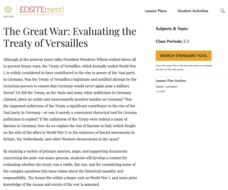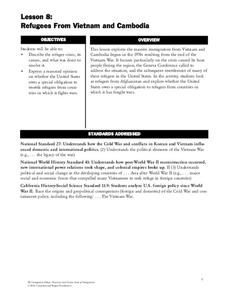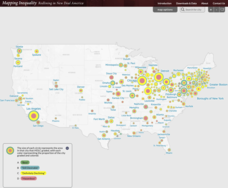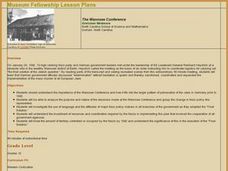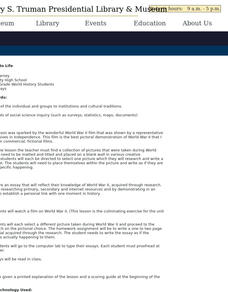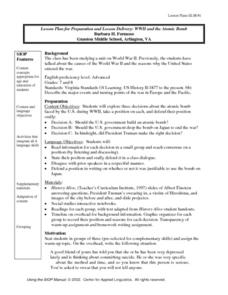Curated OER
The Great War: Evaluating the Treaty of Versailles
Young scholars examine and evaluate the Treaty of Versailles. They read and discuss primary source documents, explore various websites, develop a list of postwar goals for France, Germany, and the U.S., and evaluate whether the treaty...
Curated OER
"my Dear Little Boys..." Using Wwii Primary Documents: a Letter Home From the War
Students read letters written by soldiers during World War II in order to analyze the soldier's feelings about the war. They explain how these primary sources teach appreciation for the World War II soldier's experiences.
Curated OER
Anne Frank: One of Hundreds of Thousands
Middle schoolers conduct research to put Anne Frank's diary into historical context. They use maps, timelines, essays and websites to examine the early victories of the German army, paying special attention to the Netherlands and...
Curated OER
Bringing the U.S. into World War II
Learners research and explore the cause and effects of global warfare. They assess the concept of the United States policy of isolationism as it involves the United States and Japanese relations. Each group of students prepare a time...
National WWII Museum
“My Dear Little Boys…” Interpreting a letter home from the war
Letters have long been prized by historians as primary sources for what they reveal not only about events but also about the emotional responses of the writers to these events. "My Dear Little Boys," a letter written by Leonard Isacks on...
Curated OER
Under the Blood-Red Sun
Fifth graders explore U.S. history by reading an award winning book about World War II. In this Japanese internment camp lesson, 5th graders read the book Under the Blood-Red Sun and discuss the entrapment of Japanese-Americans on our...
Curated OER
Camp Stark, New Hampshire, World War II Prisoner-of-War Camp
Students examine the political, personal, and geographical boundaries created by World War II to the citizens and prisoners of war at Camp Stark.
Curated OER
Map Stratego
Students determine strategic locations for defense against attack. They use a core map to analyze coast lines and distances to develop a strategic defense plan for the U.S. during World War II.
Curated OER
Never To Forget
Tenth graders discuss the events leading up to antisemitic behavior in Europe during World War II. Through various activities, 10th graders acquaint themselves with the political ideology of Nazism and assess responsibility for the...
Constitutional Rights Foundation
Refugees From Vietnam and Cambodia
The United States may have pulled its troops from the Vietnam War in 1973, but the conflict was far from over for the citizens living in Asia at the time. An informative resource lets learners know about the wave of over 220,000...
Curated OER
Europe 1914
In this Europe 1914 map worksheet, students note the 9 regions of the Europe labeled on the map and their relevance to World War II.
University of Richmond
Mapping Inequality: Redlining in New Deal America 1935-1940
Redlining—or the practice of racial discrimination in housing loans—directly led to today's segregated living patterns in America. Using data from the federal Home Owners' Loan Corporation, classmates visualize the impact of policy on...
Curated OER
Holocaust Pictures Exhibition
Students write reactions to selected pictures of the Holocaust. They view selected online pictures about the Holocaust and write their reactions. They use their knowledge about the Holocaust to write reactions to pictures about this period.
Curated OER
The Wannsee Conference
Twelfth graders examine what occured at the Wannsee Conference during World War II. Using documents, they discover how the conference fits into the final solution of the Jewish question. They analyze the language used and the attitudes...
Curated OER
Brave New World
Students view a video about the effects of World War II on the map of Europe. They discuss the video and answer questions. They work together to identify accomplishments that best represent American culture.
Curated OER
Turning the Tide in the Pacific, 1941-1943
Students analyze the Japanese strategy for the Pacific and compare it to the Allied strategy. They identify on a map the sites that were important the early war in the Pacific, and identify key military engagements.
Curated OER
Pearl Harbor
Young scholars identify the location of Pearl Harbor and Hawaiian Islands on a map. In this map skills lesson, students use latitude and longitude coordinates to locate various places of importance of the Pearl Harbor attack.
Curated OER
Legends Coming to Life
Students prepare an essay that reflect their knowledge of World War II, acquired through research.
Curated OER
The End of United States' Occupation of Japan
Ninth graders examine and discuss reasons for end of U.S. occupation of Japan in 1952, locate surrounding Asian countries on map, explore changes to Japan after World War II, and discuss how changes in Japan impacted other countries.
Curated OER
Turning the Tide in the Pacific, 1941-1943
Students explore the overall strategies pursued by the Japanese and the Allies in the initial months of World War II. What each side hoped to accomplish what what actually happened forms the basis of a comparison made in this lesson.
Curated OER
Victory in Europe, 1944-1945
High schoolers examine the overall strategy pursued by the Allies in the final moths of World War II in Europe by examining military documents and consulting an interactive map of the European theater.
Curated OER
Remember the Bridge: Poems of a People
Fifth graders explore poems of African Americans. They research a famous African American, write a report, create a timeline of events in African American history, create a map of the New World, and research Molly Walsh. After...
Curated OER
WWII and the Atomic Bomb
Students examine three points about the use of the atomic bomb by the US during World War II. They take a position on each point and defend it orally.
Curated OER
Great Escape Word Search
In this World War II word search worksheet, students read and analyze 24 words that pertain to prisoners of war and their attempts to escape. Students find the words in a word search.


